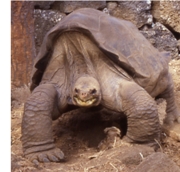A new report from the Turtle Conservation Coalition, a global alliance of conservation groups including the International Union for the Conservation of Nature (IUCN) Species Survival Commission's Tortoise and Freshwater Turtle Specialist Group (TFTSG), highlights that, without concerted conservation action, many of the planet's turtles and tortoises will become extinct within the next few decades.
 2 March 2011: A new report from the Turtle Conservation Coalition, a global alliance of conservation groups including the International Union for Conservation of Nature (IUCN) Species Survival Commission’s Tortoise and Freshwater Turtle Specialist Group (TFTSG), highlights that, without concerted conservation action, many of the planet’s turtles and tortoises will become extinct within the next few decades.
2 March 2011: A new report from the Turtle Conservation Coalition, a global alliance of conservation groups including the International Union for Conservation of Nature (IUCN) Species Survival Commission’s Tortoise and Freshwater Turtle Specialist Group (TFTSG), highlights that, without concerted conservation action, many of the planet’s turtles and tortoises will become extinct within the next few decades.
According to the report, titled “Turtles in Trouble: The World’s 25+ Most Endangered Tortoises and Freshwater Turtles – 2011,” some of the most endangered turtles and tortoises include the Pinta Giant Tortoise (Chelonoidis abingdoni) and the Red River Giant Softshell Turtle (Rafetus swinhoei). The report highlights that 17 of the 25 most endangered turtles are found in Asia, where they have suffered from decades of illegal and unsustainable trade. Despite the growth of large-scale commercial turtle farming in China, which is beginning to meet some of the domestic demand, wild turtle populations worldwide continue to be threatened by the demand for meat and medicinal products.
The report emphasizes that, in many parts of the world, anti-poaching laws are poorly enforced, and international conventions such as the Convention on International Trade in Endangered Species of Wild Fauna and Flora (CITES) are only partially effective in decreasing the trade. [Publication: Turtles in Trouble] [IUCN News Release]